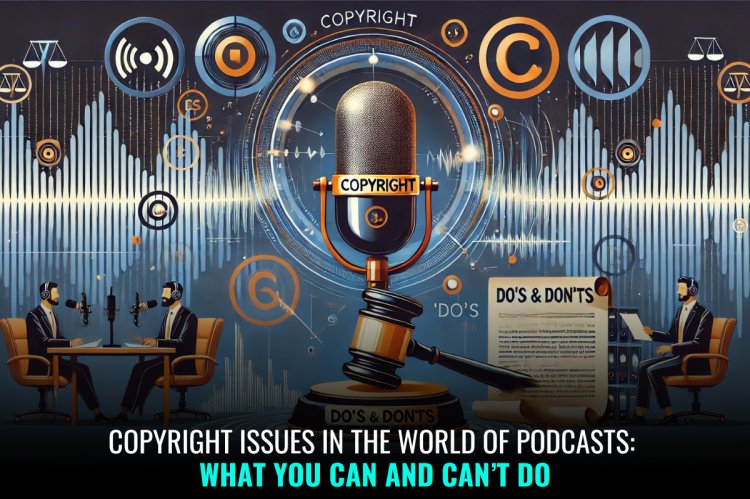COPYRIGHT ISSUES IN THE WORLD OF PODCASTS: WHAT YOU CAN AND CAN’T DO
Podcasting has become a booming industry, but with its growth comes the challenge of navigating copyright laws. Many podcasters unknowingly infringe on copyrights, leading to potential legal risks. This blog explores the key copyright issues in podcasting, including the use of music, third-party content, and fair use. We will also discuss best practices to stay compliant and avoid legal pitfalls.

Introduction
Podcasting offers a creative platform for storytelling, education, and entertainment, but it also comes with legal responsibilities. One of the biggest challenges for podcasters is understanding copyright laws. Whether it's using background music, sound effects, or referencing someone else’s work, failing to follow copyright regulations can lead to takedowns, fines, or even lawsuits.
So, what can you do legally, and where do you risk infringement? Let’s dive into the key copyright issues that every podcaster should be aware of and how to stay on the right side of the law.
1. Understanding Copyright in Podcasting
Copyright protects original works of authorship, including music, literary works, sound recordings, and scripts. As a podcaster, using someone else’s copyrighted content without permission can lead to legal trouble.
Common Copyrighted Elements in Podcasts
- Music & Sound Effects – Using commercial songs without a license can result in takedowns or lawsuits.
- Clips from Movies, TV Shows, or YouTube – Even short clips can be copyrighted.
- Interview Excerpts & Quotes – If using a guest's recorded material elsewhere, you may need permission.
- News Articles & Books – Reading or summarizing copyrighted works without permission can be risky.
2. What You Can’t Do: Copyright Infringement Risks
Here are some common mistakes podcasters make that can lead to legal trouble:
- Using Licensed Music Without Permission
- Even a few seconds of a song may violate copyright law.
- Reading Someone Else’s Article or Book Without Permission
- Summarizing or quoting too much of a copyrighted work could be an issue.
- Using Audio Clips Without Licensing
- Movie or TV clips are protected and require permission or a license.
- Playing Unlicensed Sound Effects
- Downloading and using random sound effects without verifying their license can lead to issues.
To know more about this you can follow the link below:
3. What You Can Do: Staying Compliant
To avoid copyright infringement, podcasters should follow these best practices:
- Use Royalty-Free or Licensed Music
- Many platforms offer royalty-free music for podcasters.
- Consider subscribing to music licensing services like Epidemic Sound or Artlist.
- Understand Fair Use (But Don’t Rely on It Too Much)
- Fair use allows limited use of copyrighted material, but it’s subjective and depends on purpose, amount used, and impact on the market.
- Obtain Proper Licenses
- If you want to use copyrighted content, get a license or written permission.
- Create Your Own Content
- The safest way to avoid copyright issues is by producing original content, including music and scripts.
Conclusion
Podcasting is an exciting and growing medium, but copyright issues can become a serious roadblock if not handled correctly. Understanding what you can and can’t do with copyrighted material is crucial to keeping your podcast legally sound. By using royalty-free content, obtaining licenses, and respecting fair use guidelines, you can create a legally compliant podcast without the risk of infringement.
By staying informed and proactive, you can focus on what matters most—producing great content that resonates with your audience while staying on the right side of the law.












